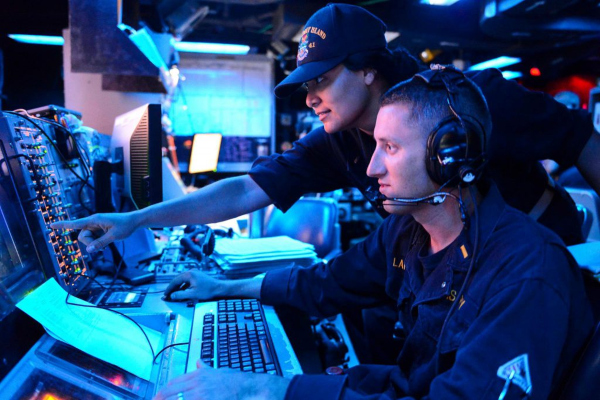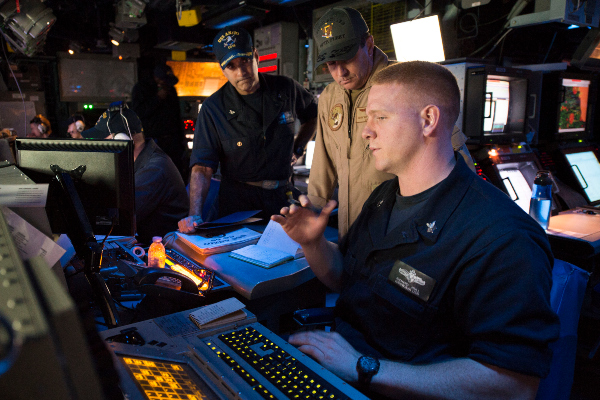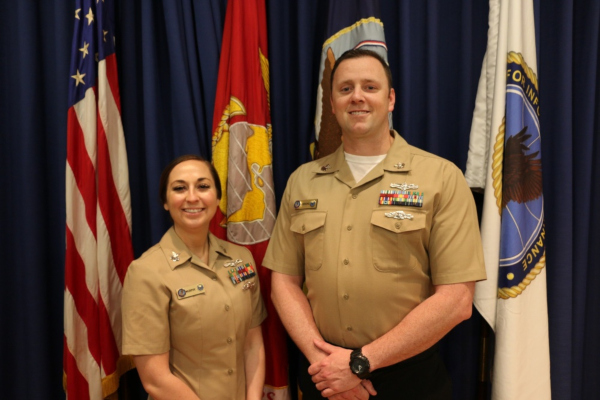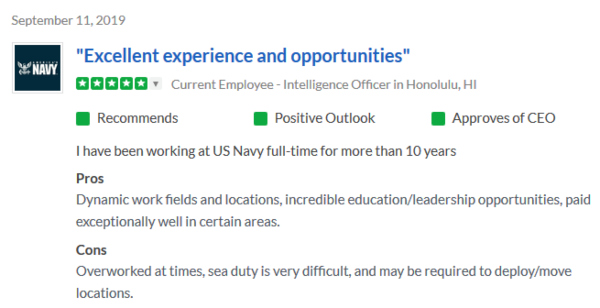A Navy Intelligence Officer conducts an important and detailed job for the military branch.
Navy Intelligence Officers specialize in handling sensitive information related to protecting national security from perceived threats.
The high demanding Navy rating challenges Intelligence Officers to gather information via human tracking, satellite, and photo/video.
Learn more about what it takes to become a Navy Intelligence Officer by reading the full article.
Related Article: 5 Best Navy Combat Jobs
Jump To A Section
Education, Qualifications, and Training
What does a Navy Intelligence Officer Do?
Education, Qualifications, and Training

The United States Navy classifies its military jobs as “ratings”.
A Navy Intelligence Officer position is not your average rating as it requires a college degree and other advanced requirements.
Here are the qualifications you need and the training you can expect to become a Navy Intelligence Officer:
Education
The United States Navy requires all new recruits to have a high school diploma or GED equivalent.
Additionally, Navy Intelligence Officers need to have a four-year degree from a regionally accredited institution.
The Navy prefers that you have a degree which focuses on areas like:
- Computer Science
- Engineering
- Government
- International Relations
- Natural Science
- Political Science
- Physical Science
While it’s helpful to already have a bachelor’s degree, it’s not mandatory.
The Navy will also accept prospective college graduates that are currently pursuing an intelligence-related degree.
However, you need to be within two years of completing the intelligence-related degree.
Finally, new recruits must achieve qualifying scores on the Aviation Selection Test Battery.
What’s exciting about the Navy Intelligence Officer career path is there are multiple opportunities for advancement.
Even though promotions are regularly available they are also competitive.
Thus, pushing yourself hard to pursue more education and receive specialized training goes a long way toward valuable credentialing and promotional opportunities.
Qualifications
The Navy accepts U.S. citizens between the ages of 19-35.
The general qualifications for Navy Intelligence Officer depend on whether A) you’re currently serving, B) have served in the military before, or C) never served before.
Along with being prospective or college graduates, prospective recruits need to meet other qualifications.
Normal color perception and vision correctable to 100% BE (provided the refractive error is no greater than 8.0 diopters) is required.
The Navy rating is a “Restricted Line Officer” which demands certain special skills, yet less rigorous vision and medical requirements.
The military branch requests that applicants for the Navy Officer program are willing to serve worldwide.
Furthermore, prospective Intelligence Officers need to be eligible for a special intelligence security clearance by the Department of Defense.
The DOD conducts a very thorough investigation into your personal character and background to make sure you are trusted for special intelligence security clearance.
Training
The United States Navy accepts a couple of different paths for training to prepare you for rating Intelligence Officer.
First, you can become a Navy Intelligence Officer through the traditional channel.
It means that you join the Navy the traditional way as you enlist and complete basic training.
Then, you can work your way up in rank and another career path before requesting a lateral transfer to Intelligence Officer.
Once you are commissioned by the U.S. Navy as an officer its time to attend the Naval Intelligence School.
The school is in Virginia Beach and lasts five months to complete the program.
The second option is to obtain the Naval Intelligence Officer career path by going through ROTC, U.S. Naval Academy, or Officer Candidate School (OCS).
Officer Candidate School takes place in Newport, Rhode Island and lasts 3 months.
Navy OCS is extraordinarily challenging and will push your mind and body.
After completing Navy OCS you progress to a 5-month basic course of instruction at the Navy Intelligence Training Center (Dam Neck, Virginia).
You’ll receive an education in amphibious and strike warfare, counterintelligence, air defense analysis, strategic intelligence, and combat mission planning.
Lastly, prospective Intelligence Officers must complete a 30-month operational fleet tour.
The fleet tour is generally an assignment with an aviation squadron, air wing staff, or onboard an aircraft carrier.
What does a Navy Intelligence Officer Do?

The U.S. Navy designates officers that handle sensitive information Intelligence Officers.
The important Navy rating expects Intelligence Officers to monitor and analyze activities that pose a threat to national security.
Consequently, Intelligence Officers study everything from drug smuggling to illegal immigration, enemy allied movement of warships and arms transfers.
Navy Intel Officers gather sensitive information through human monitoring, satellite, photos, and video.
It’s the objective of Intelligence Officers to share the information they gather with high-level military and political decision-makers.
The assessments and recommendations that Intelligence Officers provide in intelligence reports go a long way in influencing national policy.
The high demanding and challenging Navy rating allows officers to serve at the forefront of national security.
Intelligence Officers analyze top-secret information and interpret spy reports to help keep the nation safe.
Also, depending on your interests, background, and performance you may have the thrilling chance of serving anywhere in the world.
Job Duties of Navy Intelligence Officers
Navy Intelligence Officers are the first to examine the implications of the latest intelligence gathered around the world.
Intelligence Officers have keen analytical abilities where they can study patterns and other details of satellite imagery.
The incredibly important job role represents a key function of the Navy Information Dominance Corps.
The job duties include:
- Supervise the collection, analysis, and dissemination of important information.
- Participate in reconnaissance missions for the Navy intelligence community.
- Conduct analysis of the inner works of adversaries and subsequently develop intelligence for the Navy.
- Participate in intelligence support to Naval forces and multinational military forces.
- Advice executive-level decision-makers for the United States government.
Navy Intelligence Officers oversee enlisted personnel in gathering and analyzing mission-sensitive information.
The diverse Navy rating may also include other job roles such as:
- Lead the planning, development, testing, and deployment of information systems.
- Monitor and analyze maritime activities that pose a threat to national security.
- Provide real-time operational intelligence assessments to high-level military personnel.
- Plan intelligence operations and manage intelligence programs.
- Lead teams that identify enemy targets for U.S. or coalition forces.
Related Article: 5 Absolutely Worst Jobs In The Navy
What does a Navy Intelligence Officer make?

The United States Navy regulates pay based on military rank and years of service, not the rating.
As a result, the USN is just like all the other branches that do not put a higher rank (and therefore pay) on one military job over another.
However, since you are an officer you will at least earn the basic pay of O-1:
| Insignia | Pay Grade | Rank | Abbreviation | 2023 Minimum Monthly Pay |
|---|---|---|---|---|
| O-1 | Ensign | ENS | $3,637.20 | |
| O-2 | Lieutenant Junior Grade | LTJG | $4,190.70 | |
| O-3 | Lieutenant | LT | $4,849.80 | |
| O-4 | Lieutenant Commander | LCDR | $5,516.40 | |
| O-5 | Commander | CDR | $6,393.30 | |
| O-6 | Captain | CAPT | $7,669.20 | |
| O-7 | Rear Admiral Lower Half | RDML | $10,113.00 | |
| O-8 | Rear Admiral | RADM | $12,170.70 | |
| O-9 | Vice Admiral | VADM | $17,201.40 | |
| O-10 | Admiral | ADM | $17,675.10 |
What’s exciting about the career path of a Navy Intelligence Officer is that there are several levels of advancement.
It’s a position in the Navy where you can thrive with the right work ethic and discipline.
However, serving the Navy as an Intelligence Officer will also push you in every feasible way.
At the end of the day, you’ll still earn better pay because the job role is only available to officers, not enlisted personnel.
Benefits
The U.S. Navy offers benefits with a monthly salary:
- Medical Insurance
- Vacation Time
- Special Pay
- Retirement
- Affordable Life Insurance
- Education: Sailors can earn full-tuition, merit-based scholarships, allowances for books and fees, plus an annual stipend for living expenses.
- Housing: Allowances for living expenses, utilities, and maintenance.
- Food: Allowance for the on-base dining hall and access to tax-free department and grocery stores.
Job Reviews
The overall job score and reviews for serving the U.S. Navy as an Intelligence Officer is very strong on GlassDoor.com:

While most former Intelligence Officers confess to a stressful work environment, the opportunities for advancement are spectacular.

Intelligence Officers have the ability to serve overseas, aboard aircraft carriers, and at joint operations command centers.

As one former Intelligence Officer put it: “pick your rate, choose your fate”.
There is no doubt about it that you have more control over your destiny striving to become an Intelligence Officer compare to other Navy ratings.

Civilian Job Opportunities
Becoming a Navy Intelligence Officer is considered more of a military career than others that might serve the military for a temporary amount of time before moving on with life.
It takes at least four years of additional study to earn a college degree so by the time many attain the rating of Navy Intelligence Officer they are prepared to make it their career.
Regardless, if you do decide to leave the Navy at some point there are plenty of opportunities in other government sectors, like the CIA or NSA.
Intelligence Officers are very skilled and knowledgable people that can succeed in any civilian opportunity they pursue.
Related Article – Navy Intelligence Specialist (IS): Career Details
Summary
A Navy Intelligence Officer is vital to keeping the nation safe.
They work as spies for the U.S. Navy gathering intelligence on enemy positions and maritime activities to keep the world protected.
It takes a lot of education and training to advance to a Navy Intelligence Officer, but it’s a once in a lifetime opportunity with plenty of opportunities for promotion.
Resources:
- https://www.navy.com/careers/military-intelligence
- https://www.indeed.com/cmp/U.S.-Navy/reviews?fcountry=ALL&fjobtitle=Intelligence+Specialist
- Navy Promotion Timeline for Enlisted & Officers - June 19, 2024
- Navy SEAL Training (BUD/S) - June 19, 2024
- Navy Aircraft Carrier Flight Deck Shirt Colors Explained - June 19, 2024
Originally posted on April 1, 2020 @ 4:14 pm
Affiliate Disclosure: This post may contain affiliate links. If you click and purchase, I may receive a small commission at no extra cost to you. I only recommend products I have personally vetted. Learn more.
